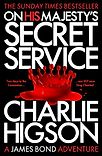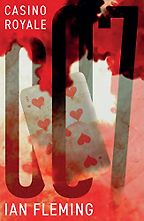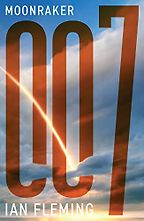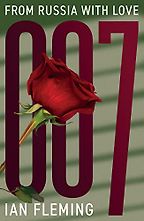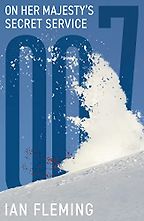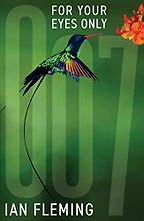Before we get to the books he wrote, can you tell me a bit about Ian Fleming and who he was?
Ian Fleming was a very interesting character. When he was young, he was seen not exactly as the black sheep, but as the less successful one of the family. His elder brother Peter was a star from quite a young age, and a very popular writer. He wrote travel books where he went off up the Andes in search of lost cities. They’re very entertaining books, and they’ve got a very modern feel. Peter Fleming was the golden boy.
Ian Fleming tried a bit of everything. He went into the City and described himself as the worst stockbroker in London. He did eventually find his feet as a journalist and ended up in charge of the travel desk at the Sunday Times. His training as a writer was as a journalist.
Then, during the war, he worked in Naval Intelligence, the Secret Service, as an assistant to the man who is the model for M in the James Bond books, Admiral Godfrey. For a long time, Fleming’s war work was slightly dismissed—‘Oh, he was just an office boy. He didn’t go on any actual missions himself.’ But a lot was classified and as more information has come out, we find that he was a lot more involved in some quite major stuff that was going on during the war than he’s been given credit for.
During the war, he loved the idea of making up plots. It’s interesting because plot has two meanings: planning to do something—undermine someone or some system—or the plot of a novel. Fleming liked both. One of the plots that he had a bit of input into was the idea that turned into Operation Mincemeat. The idea was to use a corpse, equip it with false papers and get it into the sea so that it’s picked up by the Germans. This misdirected the Germans about where the D-Day landings were going to happen. Fleming loved that idea. He’d read about it in a book, a work of fiction. It really sums up the sort of ideas that he liked—creative and slightly outrageous.
He was also involved with setting up commando units that were going behind enemy lines and he had experience of that more meaty, physical, soldierly aspect. He knew a lot of these agents in the war, both commandos and special forces: this breed of quite tough, often eccentric individuals, who went in and put themselves in great danger. They were often caught and tortured and treated very brutally by the Germans. He debriefed a lot of them when they came back. He was really interested in these types of characters.
He felt that World War II had changed so much. He wanted to write a spy or adventure book, but not a Lord Peter Wimsey or a nice, cozy, Golden Age crime book. He said, ‘We can’t have this cozy view of the world—that doesn’t wash anymore. I’ve seen the brutality, the terrible things that men are capable of. We’ve seen what happened in the war, the huge chaos and destruction and death on an unprecedented scale. I want to write a new type of spy story. I want to write a spy story to end all spy stories.’
Not long after the war, in 1952, he sat down to write just that. And he came up with the idea of a very blunt, straightforward man of action with a very simple, unfussy name, James Bond. He was based partly on these agents, partly on his brother, Peter, and he also put some aspects of his own personality into him. He really changed the face of whether you even call it spy fiction, I don’t know. But Casino Royale was, in many ways, a very modern book which sparked a new type of action-adventure writing.
Let’s get straight into the books you’ve chosen, as Casino Royale was the first one he wrote and also the first on your list. Is it a good one to start with because it’s the first one or is it still a work in progress? Ben Macintyre has been on Five Books and thinks Casino Royale is the best Bond book. What are your thoughts?
If you would like to know what an Ian Fleming James Bond book is like, Casino Royale is the perfect place to start. It’s a really good, punchy novel. It’s the birth of James Bond: the first time he’s out in the world on the page. You can see so much of what is key and familiar from the James Bond stories is in there. But you can also see that Ian Fleming is still finding his way on exactly how these stories work.
The book is set in a place called Royale-les-Eaux, which is probably based on Deauville in northern France, a place Fleming visited a lot. Fleming loved gambling and he loved travel. He puts in a lot of detail of the stuff that he’s interested in and knows about.
He also comes up with this slightly crazy plot. He beds it in reality, and then takes it one stage further. [SPOILER ALERT]. Le Chiffre is a communist agent. He’s the banker for the communist infiltration of the trade unions in France, and he’s a big gambler. He’s lost all the Russian money, and the Brits find out he’s going to go and try and make it all back by gambling at this casino in Royale. They think, ‘What if we sent in an agent to bring him down?’ And so James Bond is sent in.
“He came up with the idea of a very blunt, straightforward man of action with a very simple, unfussy name”
It’s a ridiculous plot on some levels, but fascinating on others. They play Baccarat, which is a game of pure chance. There is no skill involved, so the idea that James Bond could be a better gambler than Le Chiffre…but it’s that aspect of gambling as a one-on-one human combat. It’s about psyching out your opponent and psychologically beating them so that they make a mistake. It’s got that great sequence at the heart of it.
It’s also the story of him meeting and falling in love with Vesper. Bond is about 35 in the book, and he says that as a Double O agent for MI6, he has a limited lifespan. Agents very rarely last beyond 40—they either retire because they’re burnt out or they’re dead. He is seriously thinking it might be the last mission he does. When he falls in love, he says, ‘That’s it. I’m getting out of this because I couldn’t have a relationship with her if I stay as a secret agent. My life is going to be in danger. I’m going to be away a lot of the time and her life is going to be in danger. But if I retire, then I can finally settle down and live a happy life as a normal person.’ But things happen at the end of the book—a huge betrayal which is evidence of what he sees as the awful amorality of the Russian secret service—and he decides: ‘No, I’m not going to retire. I’m going to devote the rest of my life to fighting these people.’
It’s quite a dark book. It’s a cold book in some ways, but it is the first time we see 007 walking onto the world stage.
The next Fleming book you’ve chosen is Moonraker, from 1955, which wasn’t his next book was it?
No, the second James Bond book was Live and Let Die. Casino Royale was the first outing for James Bond, and over the course of the next three books, you can see Fleming finding his way, trying things out, sending Bond to different places.
He was very canny, Fleming. He realized he’d come up with a really good, strong and interesting character, this new type of hero who has many negative qualities. He is an assassin, for a start. And he thought this could be really big, but he knew that two things needed to happen to cement his longevity.
One, the books would need to be bestsellers in America. The first book, Casino Royale, became a bestseller in the UK. But he didn’t want it to be a parochial, English thing. It had to be big in America.
He also had to get it on the screen. For Casino Royale, he managed to get CBS to buy it, and they did a live TV drama version of it, if you can imagine trying to fit a James Bond story into an hour of live TV drama! Luckily, it wasn’t a success, because actually James Bond, in the filmic version, was much better suited to the 60s—where you could explore a bit more of that cynical, amoral side of things. It could be sexier and glossier.
But you could see in the second book he wrote, Live and Let Die, an attempt to get the book popular in America, with Bond getting sent to America and getting involved with criminal gangs out there. It was a slightly failed attempt, I think, at breaking the American market.
Tell me more about Moonraker.
Moonraker is the third book and the only one that’s set entirely within Britain. We’re starting to see some of the classic elements come into play—the relationship with M, the set-up at MI6. Interestingly, the woman he teams up with, Gala Brand, is a policewoman. And there are elements of Moonraker that feel more like a police investigative story than the classic James Bond international thriller. That’s one of the things I like about it.
There are some great bits of descriptive writing in the book. Fleming was very good at writing about action, which actually is very difficult to write. There are some great action sequences, including a nighttime car chase through Kent which ends up with the villains releasing huge rolls of newsprint from the back of a lorry which come tumbling down the road and smash into James Bond’s car. It’s brilliantly described. It feels like what you get in the James Bond films.
You can just imagine Fleming, newspaperman, seeing these lorries and thinking, ‘Wow! What would happen if one of those rolls fell off, and you were going at speed?’. You can see how his life experiences fed into his books. He was always thinking, ‘What could we do with this?’
There’s also a fantastic description of a card game. In a lot of the books, Bond is called in to see M, who says, ‘This is the villain, go and investigate him.’ And Bond then goes off to see the villain. In Moonraker, Hugo Drax is a member of M’s club who is cheating at cards. In the classic structure, James Bond has a mock combat with the villain quite early in the book as a way of meeting them and getting close—famously, the golf match in Goldfinger. But, in this book, it’s another card game. Bond plays cards with Drax, the card cheat, and it goes from there.
There are some great parts of the book. Gala Brand is a really strong and interesting character. In the books, the women are quite tough, independent and athletic. To call them Bond girls demeans them. They’re not girly types, which Ian Fleming didn’t like. But they do often tend to be damaged in some way, and Bond sees that—he wants to put his arms around them and look after them.
The story in the book is really different from the film. It’s one of the ones where I saw almost no relation between the two.
Yes, the things they’ve picked out from it are the villain’s name and the rockets. [SPOILER ALERT] In the book, Hugo Drax is supposedly working for the British building rockets to protect the country and Bond discovers that the first rocket is going to be aimed into the heart of London. So he has to stop it being launched. That aspect is kept in the film.
Most of the rest of it isn’t because it is quite small-scale and domestic. For me, that makes it interesting. It’s a nice, taut little investigative story. But the film came out just after Star Wars. They decided, ‘Hey, we’re going to send Bond into space, and they’re all going to be wearing white.’ It becomes like a disco in space. It’s not the best James Bond film ever made, but it has a certain madcap entertainment value.
The setting of the book is memorable—it’s been a decade or so and I’m still picturing the white cliffs of Dover and that southern English seascape.
It’s very vividly described. Fleming’s journalistic training meant he was very good at summing somewhere up quite quickly and putting you there.
Let’s go on to From Russia with Love, published in 1957. Tell me more.
This was the fifth Bond book. The books were doing very well in England, but Fleming still hadn’t broken America. He said, ‘I’m just going to put everything into this book. And if this doesn’t work, I’ll stop writing and do something else.’ It’s very similar to the film, because From Russia with Love was the second Bond film made and they were still sticking pretty closely to the books.
I think it’s the best written of the Bond books. It has some fantastic and very memorable sequences and all the Bond elements you want. Fleming really did put a lot into it. It’s set in Istanbul. It’s got a sequence on the Orient Express. There’s a beautiful woman. It’s got spies and all sorts of mad adventures in Turkey.
The opening is different from the other Bond books. In the first third of the book, Bond doesn’t appear in person. It follows in some detail the setting up of a plot by the Russian secret service to bring Bond down. It’s really vividly written, creating this great villain, Red Grant, and also Rosa Klebb, the evil Russian spymaster.
Once we get into it, it’s a classic Bond story. There are a couple of bits in it which will make a modern reader wince and maybe stop reading the book. The Turkish spymaster, Kerim Bey, has an old-fashioned attitude towards women, and Bond thinks Bey is a great character. This leads into the whole debate about misogyny in the Bond books. If that is something you don’t want to read about, then I would say not to read the book. But if you read it in the historical context of when it was written and what Fleming was trying to do, it is culturally interesting.
[SPOILER ALERT] At the end of the book, Bond is killed by Rosa Klebb with the famous poisoned dagger that comes out of the end of her shoe. Fleming had said that if From Russia with Love didn’t take off, it would be the end of Bond. But the book did take off in America—particularly when President Kennedy said it was one of his favourite books and that he had it on his bedside table. At that point, Bond’s future was assured and—lo and behold—they found an antidote, and Bond came back alive in the next book.
So next up is On Her Majesty’s Secret Service, from 1963. I think this is my favorite, maybe also because it was the first one I read. Why did you pick it?
It is a great book. It’s got all the classic Bond elements in it. The film is very faithful to the book. In the book, the women are from around England, but in the film, they’re from around the world. [SPOILER ALERT] Blofeld brainwashes them by hypnotizing them to take back biological weapons that will destroy the agriculture when they go home.
It’s got the famous hideout on the top of a mountain in Switzerland. Fleming wrote about what he was interested in and where he liked visiting. He loved skiing. This was an area of the Alps he knew really well. He was fascinated in genealogy, so he researched that properly, and he put all that into the book.
It’s quite fun, the character Bond is pretending to be, Sir Hilary Bray from the Royal College of Arms. And that bit about the Habsburg chin made a big impression on me when I first read it. What was Blofeld supposed to have inherited?
His family has no earlobes. The Habsburg chin is a big thing. For some of them it was so bad, they could barely talk. It was the great line, so they could only marry other Habsburgs. So yes, there is a lot of interesting stuff going on in the book.
On Her Majesty’s Secret Service is a good, strong, tightly written book. The descriptions of the skiing are really well done, especially the sequence where Bond is escaping down the mountainside at night. Blofeld sets off these avalanches behind him and it’s fantastic.
And Bond gets married. It goes back to Casino Royale, where he says it’s too dangerous to get married. Again, he says, ‘I’m going to leave the Secret Service, I’m going to get married.’ And we see why it’s not a good idea for Double-O agents to get married.
You’ve written about how Fleming worked out the Bond formula quite early on. There is a formula, but the books don’t feel formulaic. They feel quite different to me.
Yes, because he’s constantly sending Bond to different parts of the world and there are new characters in all of them. Blofeld is the only recurring villain, and he’s not in as many of the books as he is the films.
But they do all have a few basic elements: you have M, you have Moneypenny—although Moneypenny is not quite as significant in the books and James Bond’s secretary, Mary Goodnight, initially plays a bigger role. You’ve got the Double-Os and people giving Bond his gadgets and weapons. It’s Q division in the books—not a person. Then you have your Bond villain with a lair. Bond has an initial contact of a competitive nature, gets closer, gets captured and escapes and wreaks havoc.
“It’s about psyching out your opponent”
It’s quite clever that on the back of that structure, you can tell so many different stories in so many different ways. You’ve got that very strong and simple scaffolding underpinning it, around which you can build anything and tell any story you like.
Sometimes Fleming did completely try and get away from the formula. The most extreme one is The Spy Who Loved Me, a first-person narrative told from the point of view of the woman in the book—not very successfully in my opinion. Fleming actually banned the book from being republished for a long time. Bond doesn’t come in until later, and he mucks it up. Fleming was reacting to his critics, saying, ‘They’re not all the same! Bond is not this cardboard cutout hero.’
Let’s turn to your latest James Bond book, On His Majesty’s Secret Service. This is for adults, because you’d already written some brilliant ones for young adults. Tell me a bit about your approach to writing Bond books and how you got involved.
I was approached to write the Young Bond series about 20 years ago. I’d written four thrillers in the early 90s. My editor, Kate Jones, had ended up working for the Fleming estate, and she knew I was a fan of the James Bond books. I really love American stripped-back, hard-boiled fiction, which Fleming did too. He was the first English writer who really embraced that brand name fiction, where you don’t describe a car in great detail over three pages—you just give the color, the make and the model and the year. It keeps things very concrete and very tight. Kate felt my writing style would work well for younger readers.
When she approached me, I thought, ‘How would you go about writing a new James Bond book when there have been so many books and continuation novels and films? I wouldn’t know where to start.’ But then she told me it was to write young James Bond books. I thought, ‘That would be fun, because Fleming didn’t really write about that. It’s an area that has not been covered, so there’s enough space for me.’ I have three boys and I’d been trying to think of a good action-adventure story idea. Writing about the young James Bond was absolutely perfect. So I leapt at it, and luckily, they liked my ideas, and I had huge fun writing five Young Bond books.
Then, in February last year, the Ian Fleming estate approached me. The coronation of King Charles was coming up, who is a big James Bond fan. It was also the 60th anniversary of On Her Majesty’s Secret Service. They wanted to do something called On His Majesty’s Secret Service for charity, in time for the coronation. They said it was probably best not to do a story about trying to disrupt the coronation or assassinate King Charles, at which point I said, ‘Yes, that’s the plot! Brilliant. It’s got to be that.’ The story sprang fully formed into my mind.
We ended up doing it with the National Literacy Trust, which is a charity that I am quite involved with, as is Camilla, who is a patron. They do a huge amount of research on literacy, looking at disadvantaged children and access to books and reading standards and a lot of lobbying in Parliament. It’s a great charity, so I was very glad that we were able to do the book with them.
Initially they asked for 4,000 words, because there wasn’t much time, but they said it would be great if I could stretch it to 10,000. So I went back and I read all of the James Bond short stories to see how you do Bond in a short format. I started writing it at the beginning of last March. I had so much stored up inside me, it ended up at over 40,000 words, which is about the same length as the shortest of Fleming’s books. I had accidentally written a short novel in a month.
And it feels very Ian Fleming—you’ve really captured something of him.
I’d spent so long in that world and trying to get inside his mind! I didn’t try and write it in his style, which is very distinctive; one good reason to read the books is his narrative style. But I wanted it to be in the spirit of Fleming. I wanted James Bond to be true to Fleming, but also to be a contemporary 35-year-old man who hasn’t been shaped by the Second World War, who hasn’t witnessed that brutality and carnage and been part of the British Empire at its peak before it collapsed after the war.
We’ve got a fresh set of challenges that he’s dealing with—populism…
Yes, and extremism, because in the end, Bond is an instrument of the civil service. He’s about trying to hold things together and prevent chaos and disruption. When I was looking to write the book, I was thinking, ‘Who are the people who really, at the moment, are threatening the stability of Britain and leading to chaos and destruction? It’s not immigrants. It is disruptors, it is populists. It’s the likes of people like Nigel Farage.’
You mentioned Fleming’s short stories. Lastly, let’s turn to For Your Eyes Only, which is a collection of them.
As I said, in writing my book, I was wondering, ‘How do you do Bond in a short story?’ and it was really interesting to see how Fleming did it. He came up with a good plot for each story. He was trying to develop a TV series and they’re based on outlines he’d written for that. They’re intense moments, in a way, vignettes of a key event that he gets involved with. In one of them, he’s sent to assassinate an enemy spy with a sniper’s rifle.
They’re a good variety of stories, and they’re all very punchy. He puts James Bond into a different situation, in a different location, in each one.
By the time he wrote them, people knew the character of James Bond, so he could take a lot for granted in the writing of them. We know the whole backstory of James Bond. But I think even if you haven’t read a James Bond book, they’re good, fun little stories.
In terms of his life, for somebody who wants to read a biography of Ian Fleming, do you recommend the most recent one by Nicholas Shakespeare?
It’s a great book. It’s very thorough and quite long. The previous one by Andrew Lycett is also very readable. They’re both good ways to find out about Fleming. There’s not as much as you might expect about James Bond in the books, but if you are really interested in Ian Fleming himself, then they’re fascinating.
As I mentioned before, a lot more has come out about what Fleming did during World War II. So there’s a lot about that in the new biography. Shakespeare’s thrust in the book is that even if Fleming had never written James Bond, he would still have been a fascinating, interesting and important character because of what he did during the war. Both biographies are saying, ‘There’s a lot more to Ian Fleming than just James Bond’—which is perfectly valid.
What is fascinating about Fleming is that James Bond was only the last few years of his life. He died in his 50s of a series of heart attacks. He had done a lot before he started writing the books—it’s just that those books that he wrote between 1953 and when he died, in 1964, is, for most people, what we remember him for.
If you’re a Bond fan and you want to find out more about Fleming and the creation of the novels, there’s a great book by Henry Chancellor called James Bond: The Man and His World. The Fleming estate gave Chancellor full access to Fleming’s archive, and he’s gone back and looked at all the bits and pieces that came together to make each book and the influences.
So if you want to find out more about what Fleming, as a man, got up to and all the other things that he did, the Shakespeare book is brilliant. But if you want a lighter book and James Bond is your way into it, then I would recommend the Henry Chancellor.
Interview by Sophie Roell, Editor
August 14, 2024. Updated: September 17, 2024
Five Books aims to keep its book recommendations and interviews up to date. If you are the interviewee and would like to update your choice of books (or even just what you say about them) please email us at [email protected]
Five Books interviews are expensive to produce. If you've enjoyed this interview, please support us by donating a small amount.

